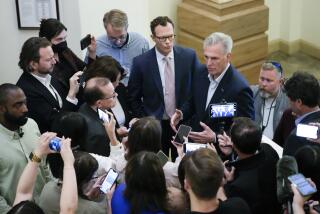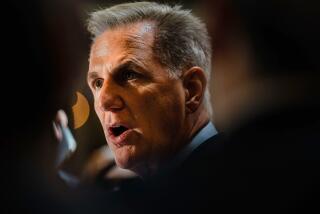Disputes Stall Japan’s Reform Plan as Finance Minister Holds Talks in U.S.
- Share via
TOKYO — The Japanese parliament is inching toward a compromise on vital financial reform legislation, but a fierce, behind-the-scenes political struggle sent Japanese Finance Minister Kiichi Miyazawa to San Francisco empty-handed Friday for crucial meetings with U.S. Treasury Secretary Robert E. Rubin and Federal Reserve Board Chairman Alan Greenspan.
Officials of Japan’s ruling Liberal Democratic Party, or LDP, who had hoped to have at least the broad outlines of a compromise deal hammered out in time for the meeting, are now hoping to have made tangible political progress on cleaning up Japan’s financial mess by the time Prime Minister Keizo Obuchi visits President Clinton in Washington later this month.
Both sides said after the San Francisco talks that no new initiatives were offered.
Despite the near panic in world financial markets this week, Japan will have to resolve its political gridlock Japanese-style, meaning painstaking multi-party negotiations, face-saving compromises and much more time than an impatient world would like, politicians and analysts here say.
Unless Japan acts soon, “there’s not going to be a hard or soft landing but a crash landing,” warned Kathy Matsui, chief strategist at Goldman Sachs Japan.
But Obuchi spokesman Akitaka Saiki countered: “If [Obuchi] were a dictator, he would be able to take quick action, but this is rather too much to expect from a parliamentary democracy like ours.”
After weeks of study and negotiation, Japan’s three major opposition parties have at last agreed on an alternative plan for dealing with Japan’s gigantic bad loan problem, now estimated between $620 billion and $1 trillion.
The opposition plan, submitted to the parliament Thursday, calls for the creation of an independent agency, free from interference from the much-criticized Finance Ministry, to take over insolvent banks. The agency would have two years to shape up or shut down the banks--compared with five years under the LDP’s “bridge bank” scheme--but would keep credit flowing to worthy borrowers.
There are indications that the bill’s three sponsors are far from united, however, and might easily splinter during the tough negotiations with the LDP expected next week. The Communist Party plans to submit its own alternative plan.
And even before the opposition and the LDP can hash out a compromise on the financial reform package, they must agree on whether and how to rescue the failing Long Term Credit Bank, Japan’s eighth-largest bank. The LDP proposes to use as much as $7 billion in public funds to finance a merger between that institution and Sumitomo Trust Co. But the Democratic Party of Japan and the Liberal Party say this would be a hopeless waste of public money.
On Friday, Miyazawa reiterated the LDP’s willingness to compromise, noting that “there are very few ideological differences on the bills.”
But opposition figures are talking tough and insisting that there is a significant ideological rift. For example, they are adamantly opposed to using taxpayer money to prop up banks that are technically insolvent but have not yet gone under.
“To propose using so much taxpayer money with no disclosure is like slamming a lid down on something that smells,” the leader of the Liberal Party, Ichiro Ozawa, said Tuesday. “. . . This is the worst kind of political response.”
Yoshito Sengoku, a key Democrat on the parliamentary committee thrashing out the bills, charged that the LDP’s “collusive relationships with vested interests such as banks, construction companies and agricultural enterprises”--the debt-laden firms considered most likely to go bust--are preventing the ruling party from embracing meaningful reform.
To cave in and endorse the LDP’s cosmetic plan, Sengoku asserted, would be to sell out the Japanese taxpayer and merely postpone the need for radical financial reform until it will be even more painful and expensive. And if financial markets plunge during this protracted political struggle, that will only spur the LDP to accept the inevitable, he said.
“Unless [the Nikkei stock index] plunges to 12,000 and the yen falls to 180 [per dollar], they won’t feel a real sense of crisis,” Sengoku said.
But Muneo Suzuki, the LDP deputy chief Cabinet secretary who is charged with working out a deal, insisted that the opposition must put the national interest ahead of political gain and compromise--fast.
It is not clear whether either the opposition or conservative LDP members, who want to protect their constituents, will give up without at least the appearance of a fight.
“It takes time to persuade the LDP members to compromise, even though they know they will eventually lose,” said Hiroshi Takaku, a parliament watcher at the Japan Center for International Exchange.
Takaku and other analysts predicted that since no politician wants to be seen as the culprit who tipped the world into recession, a deal is only a matter of time.
Times staff writer Mark Magnier in Tokyo contributed to this report.
More to Read
Sign up for Essential California
The most important California stories and recommendations in your inbox every morning.
You may occasionally receive promotional content from the Los Angeles Times.









